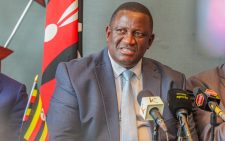How Comoros dirty tricks fixed Stars

Football Kenya Federation (FKF) feel it is a victim of unfair judgement after the Confederation of African Football (CAF) banned the federation’s Chief Executive Barry Otieno and Harambee Stars Team Manager Ronny Oyando for six months, claiming they were found guilty of delaying Covid-19 testing during the country’s 2021 Africa Cup of Nations qualifier against Comoros in November 2020.
CAF barred the duo from any of its activities with the continental body further ordering FKF to pay Sh 2.2 million (20,000 US dollars) in fines, as a result of their actions on November 11, 2020 when Kenya played Comoros in Moroni.
The ruling by CAF revealed that four visiting players had tested positive for Covid-19 but they went on to feature in the game risking contamination of those involved in the match.
The game ended in a 1-1 draw with Kenya losing the return game four days later 2-1 to exit the competition.
Details of the saga that sounds like a Hollywood script has now emerged, with disturbing facts on how a plot was hatched by the hosts, to Harambee Stars key players locked out of the crucial Africa Cup of Nations qualifier.
They claimed that four players and two technical bench officials had tested positive of coronavirus and were not to feature in the duel.
The four players included skipper Victor Wanyama, custodian Arnold Origi, Ayub Timbe and defender Eric ‘Marcelo’ Ouma.
“We don’t agree with CAF’s decision because they were miss informed, but we will not appeal, we will just take the punishment for the sake of maintain a good relationship with the continental body,” said a senior federation official who sought anonymity.
He added: “If the four players had tested positive for coronavirus in Comoros, how could they test negative two days later upon the team’s return to Kenya and they went ahead to return to their respective clubs and were allowed to play after passing all tests?”
FKF in their protest letter to CAF on November 15, 2020 wrote that the host federation did not provide a laboratory or a testing facility for Covid-19 upon the team’s arrival, but instead carried out the tests on the match day a few hours to the match and used expired test kits.
“We believe that the expired testing kits used, raises doubt on the credibility of the results.
The team had taken tests in Nairobi a day before it travelled to Comoros, which was well within the stipulated 48 hours before the match,” the letter read.
It added: “Before we left, all players were in a bubble and the government gave us a chartered plane which was fumigated.
We also had an advanced team in Comoros which organised vans for the team and had them fumigated as well and when we arrived, the players were again placed in a bubble, awaiting the match.”
CAF charged that on the day of the match, the General Secretary of the Comoros Football Federation came in early to take their PCR tests, and he was met with refusal from the Kenyan national team’s management.
They then delayed the process for three hours until they finally gave in. “The test results arrived just a few minutes before kick-off, during warm-up, due to the said delay,” CAF said.
According to CAF, the match commissioner did not get the chance to check the results himself as Otieno and Oyando disputed the results as soon as they became aware of them and snatched them from his hands and tore them apart.”
According to the PCR tests copies that were acquired after the match, four players have all tested positive before the match yet took part in the game and risked the contamination of the opposing team as well as their fellow teammates and all officials that were involved in match 94 of the Total African Cup of Nations Qualifiers,” CAF said.











